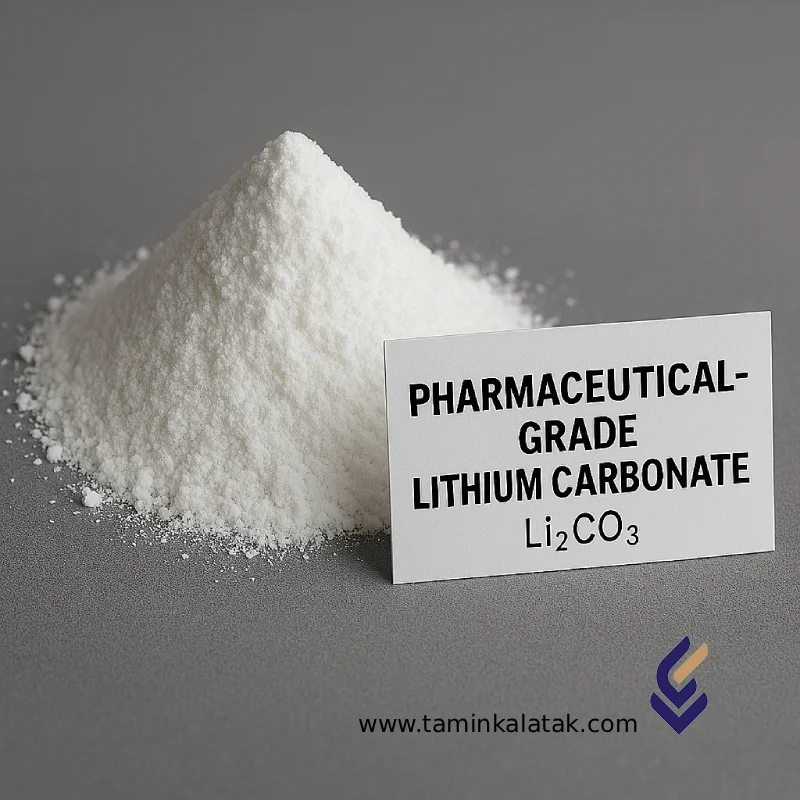Medicinal lithium carbonate
Lithium Carbonate (Li₂CO₃) is an inorganic compound widely used in psychiatry and pharmaceutical formulations as a mood stabilizer.
It plays a crucial role in the treatment of bipolar disorder, manic depression, and mood fluctuations, helping regulate neurotransmitter activity and stabilize emotional balance.
Chemical Structure and Composition
-
Chemical Formula: Li₂CO₃
-
Molecular Weight: 73.89 g/mol
-
Molecular Structure: Composed of two lithium ions (Li⁺) and one carbonate ion (CO₃²⁻)
-
CAS Number: 554-13-2
-
Grade: Pharmaceutical / API (≥99.5% purity)
Lithium Carbonate is an ionic compound formed from one of the lightest alkali metals.
Due to its ionic nature, it dissociates partially in aqueous media and demonstrates controlled solubility, which is essential for its pharmacokinetic behavior.
Physical and Chemical Properties
| Property | Specification |
|---|---|
| Appearance | White powder or colorless crystals |
| Density | ~2.11 g/cm³ |
| Melting Point | ~723°C |
| Solubility in Water | Slightly soluble (~1.3 g/L at 25°C) |
| Vapor Pressure | Negligible (non-volatile at room temperature) |
| Purity (Pharma Grade) | ≥99.5% |
| Stability | Stable under normal storage conditions |
| Odor | Odorless |
Pharmaceutical Applications
Pharmaceutical Grade Lithium Carbonate is primarily used in psychiatric medicine for mood stabilization and long-term management of affective disorders.
Main therapeutic uses include:
-
Treatment of Bipolar Disorder
-
Control of manic and hypomanic episodes
-
Prevention of severe depressive phases
-
Reduction of aggressive or self-harming behavior
-
Component of sustained-release formulations for steady plasma concentration
Additionally, it is used in neuroscience research and drug development studies related to neurotransmitter regulation and neuroprotection.
Advantages
-
Proven clinical efficacy in stabilizing mood and preventing relapse
-
Long-term maintenance therapy effectiveness
-
Reduces hospitalization rates in bipolar patients
-
Cost-effective compared to newer mood stabilizers
-
Backed by over 50 years of medical research and clinical experience
Limitations and Side Effects
Despite its therapeutic importance, Lithium Carbonate must be used under strict medical supervision due to potential side effects:
-
Possible tremors, weight gain, and increased thirst
-
Requires regular monitoring of serum lithium levels to avoid toxicity
-
Drug interactions with diuretics, NSAIDs, and cardiac medications
-
Contraindicated during pregnancy and lactation
-
Long-term use may affect renal and thyroid function
Safety and Storage Guidelines
-
Storage Conditions: Store in a cool, dry place, protected from moisture and direct light.
-
Handling: Follow Good Manufacturing Practices (GMP); avoid inhalation of powder.
-
Administration: Use only under medical supervision and at prescribed dosages.
-
Monitoring: Regularly assess renal and thyroid function during extended use.
-
Hydration: Ensure adequate fluid intake to prevent dehydration.
-
Avoid concomitant use with interacting drugs unless approved by a physician.
Summary
Pharmaceutical Grade Lithium Carbonate remains one of the most effective and established treatments for mood disorders, particularly bipolar disorder.
Its long-standing clinical validation, affordability, and therapeutic reliability make it a cornerstone compound in modern psychopharmacology.
Medicinal lithium carbonate
| Products | Chemical formula | Grade | Physical appearance | Density (at 20°C) | Melting point | Vapor pressure |
|---|---|---|---|---|---|---|
| Lithium carbonate | Li₂CO₃ | Pharmaceutical | White powder, odorless | 2.11 g/cm³ | 723°C | Very low/negligible (at room temperature almost zero) |







